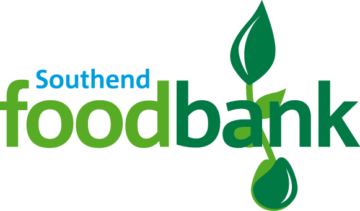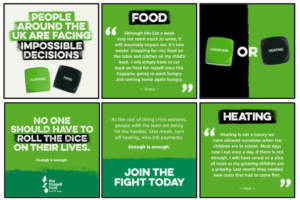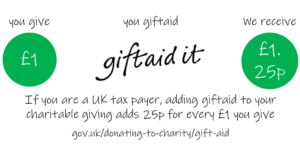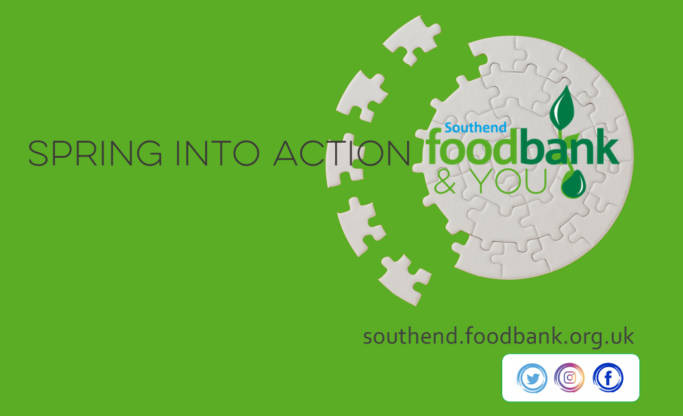
This spring, we’ve got lots of ways – 40 – to help you find the one thing you can do to support your local foodbank. Some are free, some take a little time, some you can do from home.
Check back as we update the list each week!
Whether Lent is a deeply spiritual season for you or another chance to kick start those new year resolutions without the January fog, spring is a good time to do some good in your community.
You can see our first 20 ideas in part 1.
- Spring means a two-week school holiday for Easter. Can you help add a family-friendly extra to the boxes we pack? [£, cost of donation]
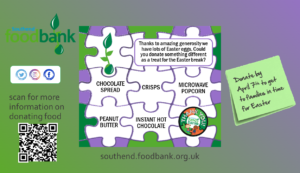
Hot chocolate, peanut butter, chocolate spread, microwave popcorn, crisps or sharing snacks are all great. And don’t forget to check out Bank the Food if you’d find it helpful to get a reminder of the basics the foodbank urgently needs right now too.
It’s not too late to start an AdLent collection if you are able to arrange a bigger collection as a group.
More information about collecting food, warehouse opening hours etc. on the Donate Food page.
- Volunteer to help at the next supermarket collection. [Free]
Can you help Southend Foodbank boost collections at Asda in May? Having a team of friendly volunteers at a supermarket makes a huge impact on the amount of donations we collect. If you have a couple of hours 6th-8th May, you can make a real difference by helping out at Asda Shoeburyness. For more information, any questions and to sign up to the rota of helpers, please email Emma [email protected]
- Take part in Trussell Trust’s Impossible Decisions campaign – read real life stories, roll the dice to see what impossible decisions you could face, and take part in saying ‘enough is enough’. [Free]
We want to work with you to build awareness and empathy for people facing impossible decisions, such as heating or eating. Many find it hard to imagine what that would be like. By inviting you to throw the dice yourself, you can better put yourself in the shoes of people facing serious hardship. At the end of the page is a digital toolkit for more way to get involved and say ‘enough is enough’.
- Whether or not your church is currently engaged with foodbanks, please take part in a short survey looking at how Trussell Trust engages with churches, faith and food poverty in their church engagement survey [Free]
Involved with a church in the UK? complete the survey https://trussell.typeform.com/to/x7eo5cEO
- Show up and support Southend foodbank at Roots Hall on Saturday April 2nd because #HungerDoesntWearClubColours [£, cost of optional donation]
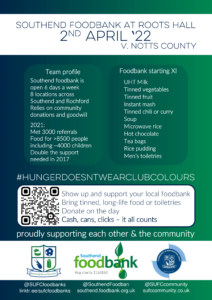
- Donate food, buy a raffle ticket or drop your loose change into the bucket all around Roots Hall – look for our volunteers in the carpark and near the turnstiles before you go in.
- Check out the raffle prizes, and buy a ticket if you’re around the ground on Saturday. Money raised from the raffle will be split between Southend Foodbank and the Shrimpers Trust in aid of their project supporting Ukrainian refugees.
- Get involved with @SUFCfoodbanks, find out more about what they do and how you can help.
- And don’t forget you can donate to the foodbank in the Blue Boar and Spread Eagle pubs, with collection crates on the bar throughout the season.
- If you can’t donate, you can still pick up a leaflet, take a picture and post it on social media to help reach more people. Find, follow and tag us in! @SouthendFoodbank (insta, facebook) or @SouthendFoodban (Twitter).
- And if you’re not around Roots Hall this weekend, you can find out more about football, foodbanks and why SUFC also means Standing Up For our Community.
- Help raise awareness about the new Healthy Start pre-paid scheme so that more low-income young families locally can access help buying food [Free]
Healthy Start is a scheme to support low-income parents if you’re more than 10 weeks pregnant or have a child under 4, to buy vegetables, fruit, pulses, fresh milk, designated vitamins, and some kinds of infant formula. You can use your Healthy Start pre-paid card anywhere that accepts Mastercard and sells the eligible healthy start food items. Currently purchases with the prepaid card can not be used online. When being used as part of a food shop, users are advised to separate their Healthy Start items from a wider shop and pay separately. The pre-paid value will be topped up automatically every 4 weeks once you have received and activated your card. Check your eligibility and apply online here: https://www.healthystart.nhs.uk/how-to-apply/
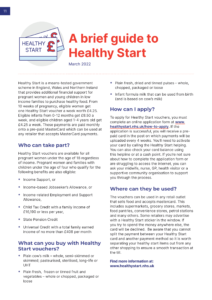
In 2021, it was estimated on average 45% of everyone entitled to use Healthy Start in Southend, and 51% in Rochford, didn’t receive the help. That’s over a quarter of a million pounds unclaimed by young families who are eligible for more financial help with their food, just in our area last year.
The application process, problems switching to the digital scheme and poor awareness of eligibility have all been highlighted as barriers.
What can you do to help?
- Find out more information about Healthy Start and share on social media or through your networks to help raise awareness:
- Translations of the Healthy Start materials are available to help parents who might benefit from having the details of the scheme explained in another language.
- The Food Justice Finder project updates Healthy Start figures every 4 weeks, so you can see the most recent uptake and shortfall locally. It looks like we’re doing a bit better in early 2022, but still more than 40% of young families are missing out locally. Enter your postcode and click ‘take action’ – the Food Justice portal will offer you a template email to send to local politicians to encourage local promotion and easier access to the Healthy Start scheme.
- Anyone still receiving paper vouchers this month will need to re-apply for the new Healthy Start pre-paid card. Under the previous scheme, around 1 in 3 applications were rejected for technical errors or misunderstanding the form rather than not meeting eligibility criteria. If you work with families with children under 4 (including pregnancy over 10 weeks), can you help raise awareness and offer support? There is a toolkit, with case studies of good practice, available for download on Sustain, which aims to share what actions can be taken by local authorities, health professionals and the community sector to increase take up of the scheme locally.
- Show up and support St Pauli on Sea v Farke Knights at their charity football match 16th April, in aid of SUFCfoodbanks [Free, plus optional £ donation]
7 a side football, Saturday 16/4/22, 12pm kick off at Goals Football, Southend. Supporters welcome. Social sharing appreciated.
- Do you have a bit more time you can give to help the foodbank? We are looking for someone to join our fundraising team, with an opportunity to take a coordinating role. [Free, donate your time]
Just as the rest of the foodbank operation has grown there is more to do behind the scenes too, especially making sure that we have enough money available for buying food and toiletries when we run out as well as finding money to cover the overheads of running a foodbank (renting warehouse space, keeping the lights on, safeguarding and IT costs etc). We have a small team who seek out and apply for grants – usually successfully! But there is also an increasing need to run events and maximise opportunities for income. You’ll spot examples of these across this Spring into Action campaign, alongside broader supporter actions that help raise awareness and engagement. We need someone who can help us do this better, and develop a team that can share the various responsibilities and work together to grow our fundraising capacity.
Some experience with fundraising is helpful, but you’ll be working alongside the current fundraising coordinator who will guide you through our existing activities, as well as linking you with a range of tools, training and guides for fundraising. Most importantly, you’ll have strong organisational skills, with a good attention to detail, and an enthusiasm for the cause you’re supporting that inspires others to get involved and donate. This is a voluntary role. You can read more about the role here.
For an informal chat, or for more information about how you could help with our fundraising, please feel welcome to get in touch with Sarah via [email protected]
- Do you have some time you can give to the foodbank? We are looking for someone to help with subtitles, alt-text and accessibility. [Free, donate your time]
As the foodbank increasingly relies on social media and the website for reaching our community, we are working to improve the accessibility of our digital resources. It’s important and we have clear tasks to tackle. We’re looking for someone to help with captioning videos and writing alt-text for images.
You might already have some knowledge of accessibility standards and good practice for alt-text and captioning, or have taken part in an accessibility audit before, or you’re a user of accessibility features. Or you might be keen to learn new, transferable IT and media skills around improving access. Training will be provided as well as guidance on using a range of free tools available. We would be happy to work with training more than one person if you would like to volunteer in a small group. This is a voluntary role, with a flexible expectation of the number of hours required. You can read more about the project here.
For an informal chat about getting involved with this kind of volunteering, you are welcome to contact Sarah [email protected]
- Are you good behind a camera and would like to donate your skills and time to the foodbank? Shoot! [Free, donate your time]
The foodbank often gets media requests for photos of our teams when we put out press releases or speak about poverty on the radio or online. We currently use a lot of stock photos from the central Trussell Trust network, but as the foodbank grows so these generic views are becoming less representative and less useful in showing people what we do. We need some help improving our visual storytelling.
If you’re good with taking photos of people, creatively capturing teams at work and sympathetic shots of settings (for example our work on location), you could really help us build our visual resources. This is a voluntary role, and could be a one-off project to produce a set of images after discussing a spec with our external communications lead. You can read more about the role/s here.
Our growing fundraising team would also love to have some help taking photos for social media coverage of events, which helps us to bring in more at collection days, so there are also opportunities for getting involved in a more ad hoc way.
For an informal chat about getting involved with this kind of volunteering, you are welcome to contact Sarah [email protected]
- Boost your donations by 25% remembering to add Gift Aid [Free on top of cost of donation]
If you’re a UK tax payer, you can add Gift Aid to your charitable donations.
Gift Aid means the government gives the charity 25p for every £1 you give. However, you must complete a Gift Aid declaration to allow the foodbank to claim this tax relief. Adding Gift Aid does not mean you pay anything extra.
You can download a Gift Aid form or you can complete a declaration whenever you donate through Crowdfunder or Wonderful.
- If you’re selling on eBay, you can choose to donate some or all of the price of your sales to the foodbank. [Free]
When you’re selling items on eBay you can add Southend Foodbank and a donation percentage to your listing. After the sale is completed, eBay automatically collects your donation through the PayPal Giving Fund (or invoices you if you don’t use PayPal) and makes the donation on your behalf.
You can also add GiftAid, which adds 25p for every £1 you give.
- Give regularly [£ cost of donation]
Regular giving means that the foodbank can rely on money coming in which helps with planning, making budget decisions about shopping for basics to avoid running out and if you set up a Standing Order you can also top up your donation by 20% through Gift Aid, giving more to the foodbank without costing you any more.
- Read and respond to new research showing the impact of the two-child limit policy [Free]
Five years on from the introduction of the 2-child limit, research published in April 2022 finds “The main impact of the policy has been to become the biggest single driver of child poverty.”
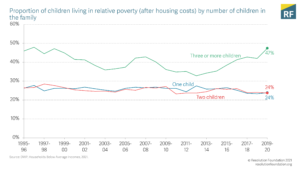
The effect of the 2-child limit is also reflected in families needing help from a foodbank. Families with more than two children were 3 times more likely to be referred to food banks, compared with their proportion of households generally (Trussell Trust 2021). Trussell Trust have been campaigning against this policy, as part of the All Kids Count campaign, alongside 70 other family and poverty organisations.
From the Child Poverty Action Group research report:
“Poverty rates have always been higher among larger families than smaller ones. While child poverty among larger families was rising before the introduction of the two-child limit, the policy has made the situation substantially worse, widening the gap in poverty rates even further. In 2019/20, 46 per cent of children in families with three or more children were in poverty (after housing costs), compared to 23 per cent of children in families with two children.”
“The policy breaks the link between what families need and what they receive, and the impact on families can be devastating. Parents do their best to shield their children, but the effect of the financial strain on families’ ability to make ends meet is unavoidable. Children should not be treated differently depending on the number of siblings they have. Yet ultimately, they are paying the price for this policy as it pushes them and their families deeper into poverty. With the worst of the cost of living crisis yet to hit, we can only expect this to get worse.”
Read the full report on 5 years of the two-child limit, the Bishop of Durham’s comment, further analysis and research, and a child poverty explainer.
- Share information about getting help and signposting [Free]
Part of the foodbank’s work is signposting to further help and support. This is extended at four distribution centres, with Citizens Advice advisors available for guests to discuss wider issues with advice professionals (paid through grant funding). We also provide a range of take-home leaflets, as well as posting updates through our social media and publishing signposting information on our website. Could you help share this information across the local community? Share a post about our opening hours, or another source of help that is relevant to your social or work groups. Print or take some leaflets to display in your workplace or community group. Display a poster or link to signposting on your website or newsletter. Boosting information about how and where people can get help builds community connections, reduces stigma about needing to use a foodbank and makes it easier for people to get the help that is available.
- Invite the foodbank to speak at your organisation [Free]
Southend Foodbank has a story to tell! Whether it’s a school assembly, adult education, community group or professional development, we can deliver an informative session. We can talk about what we do, who we support, how we work, why the need for foodbanks has been rising, and what can change to challenge food poverty and work towards a future without hunger. If you’ve read this far on our website, you probably already have some interest and knowledge about the foodbank! However, reaching beyond our existing supporters is important for a range of outcomes, including awareness, support, and finding opportunities for connection and change. To invite us, please get in touch with an outline of when you’d like us to visit, who we’d be talking to and any specific topics that interest you, via [email protected]
- As an organisation, become a place that refers people to the foodbank [Free, plus time and support in kind]
Southend Foodbank works on a referral model, where organisations across the community are able to offer a foodbank voucher to their members or clients (as well as a self-referral pathway through calling Citizens Advice directly). This is important for reaching people who might need help but aren’t sure how to get support or are reluctant to ask. Schools, GPs and health centres, mental health services, police, social work teams, churches, HAF providers, housing associations and other community organisations are voucher holders. Referral agencies receive training in how to offer a referral and are connected to the foodbank through a designated contact, who provides ongoing support and information. If you work in a community setting with people who might be struggling with food poverty, and would like to consider becoming a referral agency, please get in touch for more information via [email protected]
- Take the foodbank to work! [Free, or £ cost of support]
Workplaces and businesses can help the foodbank with collections, charity day volunteering or sponsorship. There are many examples of local businesses, independent traders and organisations doing amazing things – could your workplace try something like this?
- Host a food donation point open the public, like the Blue Boar and Spread Eagle pubs, Fairytale Lashes in Rayleigh and Truly Vi at Shoeburyness station
- Hold a food drive, working together to collect donations, like Laser 24
- Put a collection can on the counter, like Leigh publicans
- Give money, like Chalkwell Ward Residents Association
- Raise money through your work, like Rayleigh Fruit and Veg, Piperoni, or local artist Grace Edkins
- Host a fundraiser, like Hadleigh Park Cycles or Lee at Tesco/Esso Southchurch
- Run a raffle, like Fans Supporting Southend Foodbanks
- Enter the Colourthon as a team and raise sponsorship, like Southend Labour group
- Provide volunteers for supermarket collection day teams, like Southend HSBC
- Give useful items of stock, like carrier bags or items for guests
- Give services or products for free or heavily discounted, like Jo at Just Love Reading
More substantial working relationships and sponsorship arrangements are also very welcome. We’re particularly interested in sourcing a van to help with collections and distribution – could your business provide or sponsor one?
To discuss any ideas for workplace fundraising and support, please get in contact [email protected]
- Sign up for the newsletter [Free]
Easiest action on this list – scroll to the end of any page of the website, look for the ‘Keep in Touch’ field, enter your email address and you’ll receive a short update email from the foodbank, with news about foodbank activity, ways to get involved and the impact community support is making.
